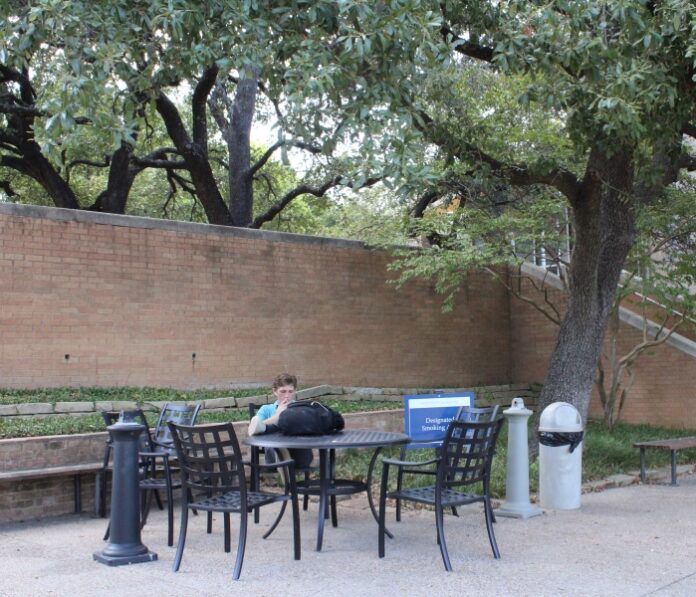
Disclaimer: All articles published within the Commentary Section are the opinions of the respective authors and do not necessarily reflect the opinions of The Cor Chronicle
As of the 2024 academic year, smoking on campus is limited to designated smoking areas only. These areas are located on the outskirts of campus or deftly adjacent to high-traffic areas.
It seems the smoking policy was motivated by concerns about public perceptions of the University of Dallas, particularly those of prospective students and families. The updated handbook, however, states that the reason for the policy change is because “Smoking of tobacco products is inherently dangerous to one’s health, and the second-hand smoke produced is injurious to the health of others who have not chosen to smoke.”
The handbook also includes a hyperlink, which leads to a ‘404: page not found’ screen. What might fill in that blank is the US Surgeon General’s 1964 discovery that smoking causes lung cancer. We have known smoking is dangerous for decades. Nevertheless, we have only recently been saved from the terror of tobacco.
Tradition is the moral, academic and cultural foundation of the University of Dallas – but tradition should never compromise morality. Those ‘traditions’ that are not beneficial to the common good should cease. However, I believe that smoking is not a detriment to the aggregate well-being of the student body.
UD has always been a school of smokers, from the time when smoking was the status quo through its fall from popularity. This is in large part because of what smoking means to the student body. There are chain smokers and there are cigarette fiends, yes. But in large part, UD smokes socially.
Smoking is a ritual; it builds camaraderie and brings people together through a shared activity. In my time at UD, I have made countless friends and memories over a cigarette, and I would wager that my smoking peers have as well. Smoking cigarettes is not necessary for social interaction, but it has objectively been conducive to countless relationships.
Smoking is an experience–an experience available on demand at the price of ten USD. Experience is the foundation of any friendship; people who have never done anything together and have no shared life experiences probably won’t be great friends. Smoking is not the only way to cultivate a bank of shared experience, but, at UD especially, it is how people come together in good faith to enjoy their community.
From Tolkien, to Chesterton, to Seidman, UD is aware of its tobacco-using, Catholic-intellectual forefathers. This tradition is now particularly ours because we are the beneficiaries of the 70-year-long marriage between tobacco and academia in Irving, Texas. How many annotated essays, theses and poems were feverishly written through the night on the Mall, aided by a noble pack of Camels? Friends pass by and sit down, they commiserate over a cigarette and efforts are reinvigorated.
When I go home for the summer, I don’t smoke. Yes, a cigarette is objectively pleasurable, but that pleasure is exponentially increased when shared. Smoking tightens the bonds of our community, and it has for decades.
I respect the wishes of every single person who does not want to be exposed to second-hand smoke, and I will smoke somewhere else as a sign of that respect. But I am immensely frustrated when a policy tells me exactly where I am allowed to smoke.
The smoking areas are separate from places of congregation which, given the alleged logic behind the new rule, is appropriate. Nevertheless, it removes the best part of smoking:the community. Now, a lone addict meanders over to the DSA to get their fix.
I believe that this policy hurts UD. This policy,among others, has hampered the livelihood I have come to love on the Mall. UD has been a bastion of tradition and principle for so long, but it is increasingly willing to compromise her core values. If health reasons are the motive for this policy, why did we wait 60 years to make it?
I believe this rule is motivated by concerns about how the public perceives campus, which is why all DSAs are hidden. It is, sadly, a microcosm of a more significant trend. The University is willing to compromise its traditions and values to conform with expectations. Your ‘independent thought’ only remains valuable so long as it is convenient and non-problematic.
Veritatem, Justitiam, Diligite.
Thomas Gillis is a senior English major.
